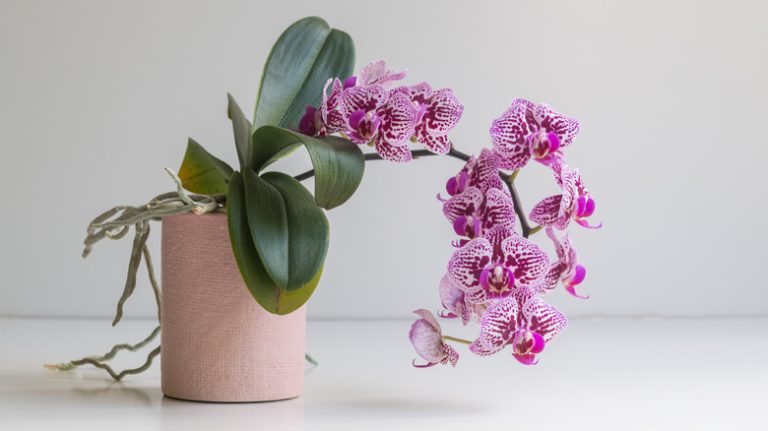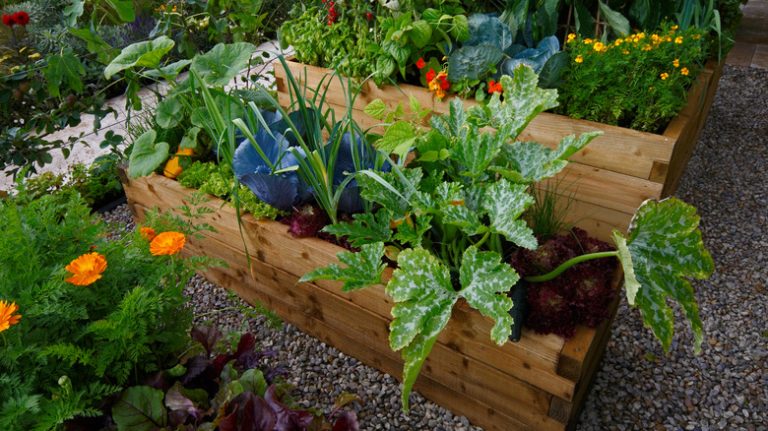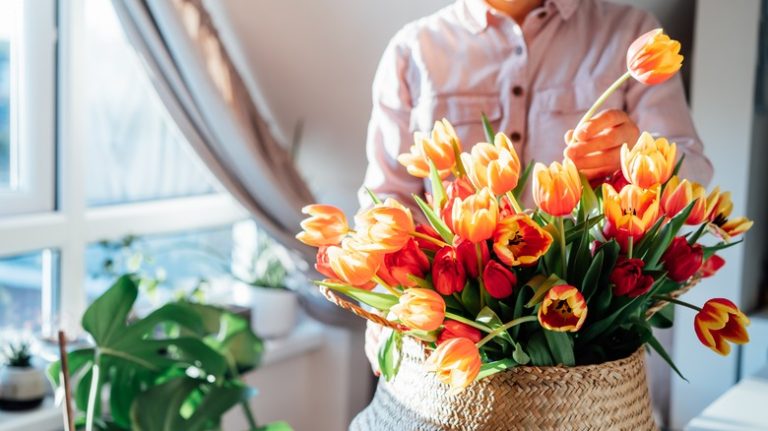Flowers can help uplift your mood in many different ways. For example, research has found that smelling their pleasant scent can help to alleviate stress levels (via the Journal of Agricultural and Food Chemistry), and as the National Audubon Society notes, flower extracts have been used in aromatherapy for thousands of years. Looking at the beautiful colors each flower has is another way they can give you an instant pick-me-up, according to Planteria Group. Yellow and orange flowers represent happiness, while the green foliage reflects peace.
Planting flowers in your garden is how you can reap their benefits. Once they have bloomed, you can appreciate them in your yard, but you can also harvest some of them to bring inside. Displaying your freshly cut flowers in your house will keep the benefits going when you’re not standing in your garden. You can even use certain flowers in teas as long as you use organic soil to grow them, so there aren’t any pesticides in your food. Luckily, these plants aren’t hard to care for as long as you provide them with the right environment.
1. Honeysuckle
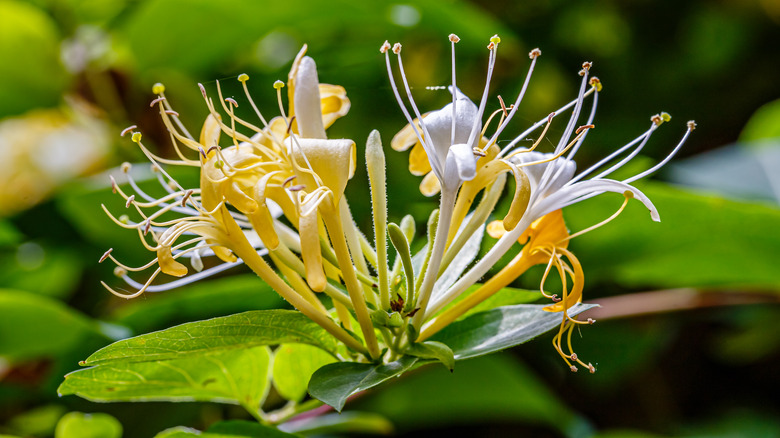
Honeysuckle is a beautiful white and yellow flower with many different varieties. You can add it to your garden as a vine, shrub, or bush. No matter what type you choose, you will get its mood-boosting properties. According to FTD by Design, the scent of honeysuckle is often used for stress relief by aromatherapy experts. This flower’s aroma can help decrease headaches, mental strain, and symptoms of depression.
To care for honeysuckle, you will need to pick a spot in your garden that gets bright sun. However, it can survive with indirect light, but it will affect the quality of the blooms. Gilmour recommends watering it regularly to keep the soil moist. Honeysuckle doesn’t like sitting in wet dirt, so well-draining soil is a must. It should also be planted in a hardiness zone of 5 through 9 because it prefers warm weather. However, it can withstand cold weather if you take the extra steps necessary to keep it from freezing.
2. Rose
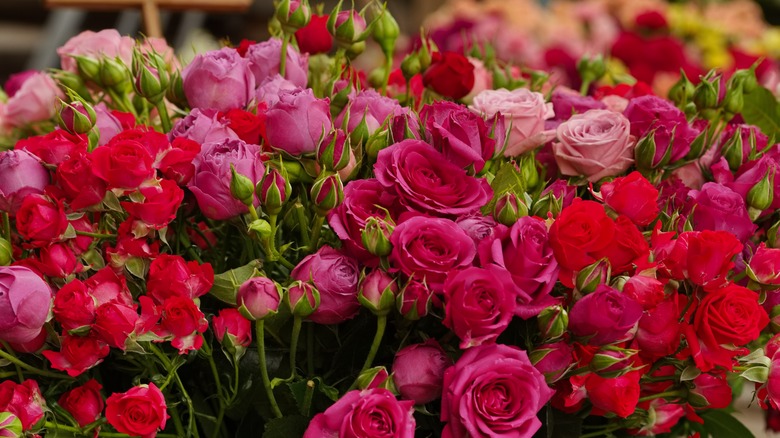
Roses are popular flowers that grow from bushes commonly with red, pink, or white blooms. Other than being known as a symbol of love, roses can help your mental health in many ways. Ferns N Petals explain that being around this flower can encourage relaxation, lower high blood pressure, relieve headaches, and even improve memory.
Since roses are perennials, you’ll be able the get these benefits all year. Once your flowers have bloomed, harvest them to display inside your home. Doing this will add to your decor and help the plant, too, because pruning encourages more blooms in the future. Caring for roses is not too difficult. Frugal Family Home explains that a rose bush needs to be in a location that will give them six to eight hours of sun each day. They also need to be watered heavily about every five days. However, if you live in a dry area, you may need to water them more often. The best place to plant a rose bush is in hardiness zones 7 through 9.
3. Jasmine
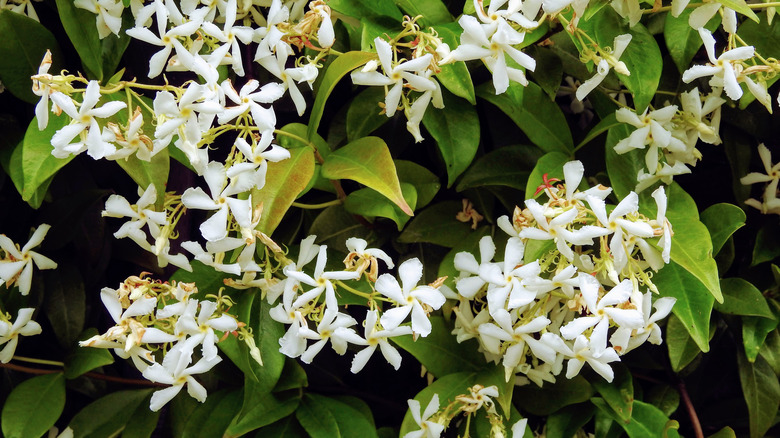
Dana.S/Shutterstock
Jasmine is a flower known for its rich scent of sweet fruit and musk. Planting this perennial flower in your garden can improve your mood and leave you feeling energized. Healthline explains that jasmine’s scent is beneficial because it causes your body to release serotonin, which is known as the feel-good hormone. Smelling this flower could help those struggling with self-confidence or grief (via Melt).
If left alone, this plant’s vines will grow and curl around whatever is nearby. Jasmine needs partial to full sun and can be grown inside, depending on the variety. It needs frequent waterings so its soil can stay moist, according to Happy Sprout. This plant thrives in hardiness zones 7 through 10 because it’s originally from a tropical climate. To encourage the beautiful jasmine flowers to bloom and produce their instant pick-me-up scent, you need to fertilize them every week with a 7-9-5 fertilizer.
4. Lavender
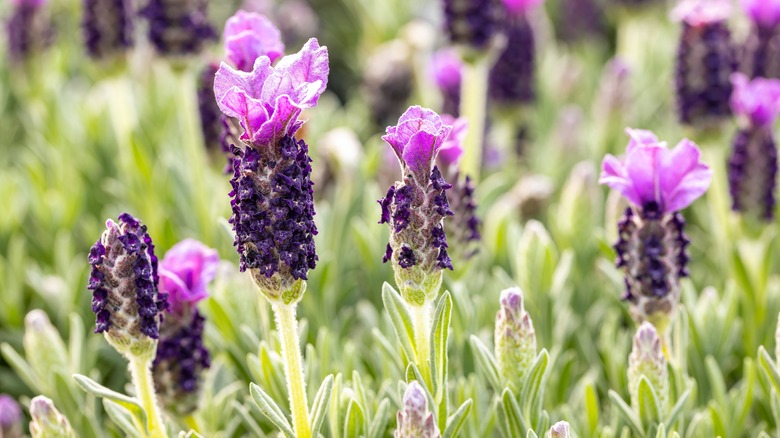
Fabrizio Guarisco/Shutterstock
Lavender is a super flower that people use in many different ways. After harvesting, the flowers are often used in cosmetics and medicinally. It has a strong scent that’s easily recognizable, which can help improve your mood if planted in your garden. Medical News Today explains that there is research to suggest lavender can help to treat depression, anxiety, and insomnia. Smelling its scent can help you to relax and also soothe headaches.
If you’re a beginner gardener, lavender is the flower you should care for first. It needs to be planted in full sun, with well-draining soil, because it likes to dry out between waterings, according to Sunset Magazine. Depending on your climate, you can water it about every two weeks. Lavender does best in zones 5 through 9 and can also live indoors. Harvesting the flowers is essential to keep the plant pruned and encourage more blooms the following year.
5. Chrysanthemums
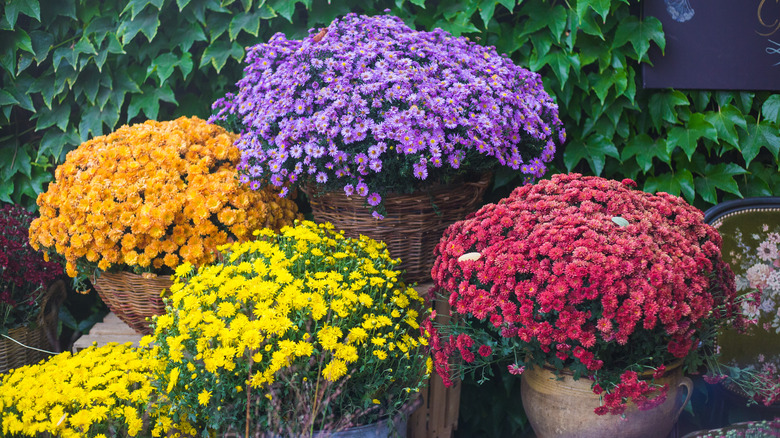
Foxphotoss/Shutterstock
Chrysanthemums are a flower often associated with fall. When you visit a farm to go pumpkin or apple picking, they usually sell mums as well. This flower comes in red, orange, white, purple, pink, and yellow. They can uplift your mood and relieve your stress because of their brightly colored flowers, according to Ferns N Petals. Each color represents something different. If you need happiness, plant yellow or orange mums (via Fresh Trimmings). For good health, go for the uncommon green-colored flowers.
Where you plant chrysanthemums is important because the plant has shallow roots that don’t do well if they’re too close to other flowers. A Cultivated Nest recommends leaving about 18 inches between each mum. They do best in hardiness zones 5 through 9, but it depends on the variety; some can handle colder weather (via the Old Farmer’s Almanac). Mums should also be in bright, indirect sun and must get watered weekly.

